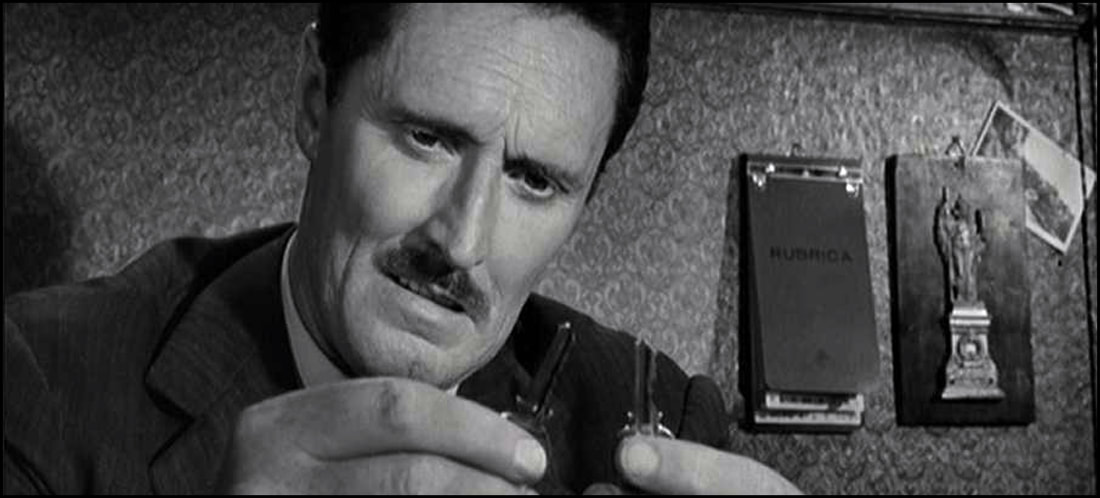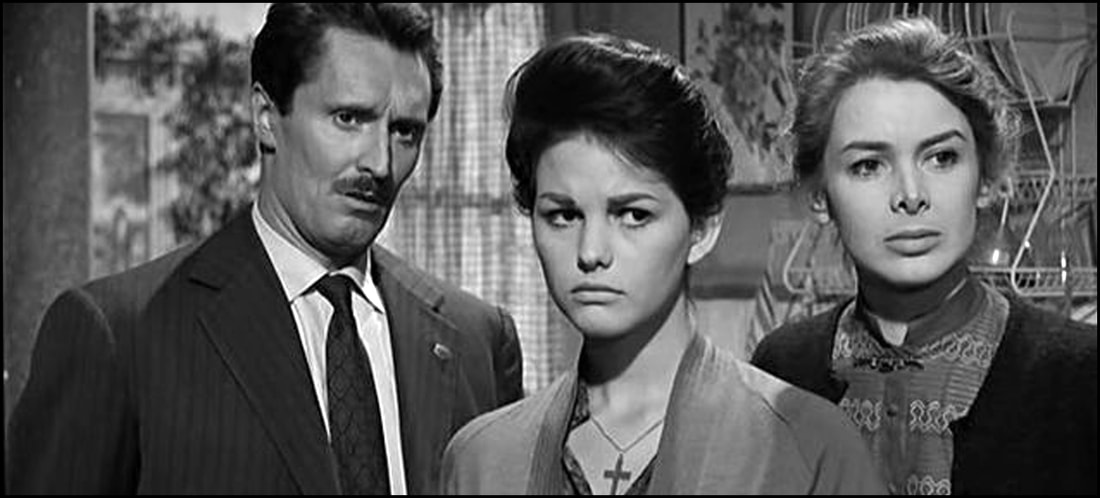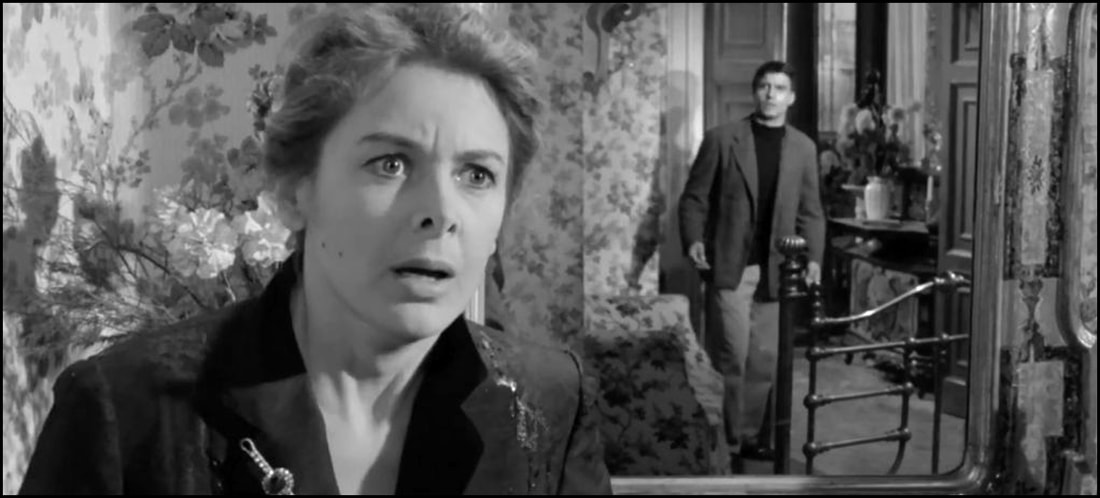Today’s distraction?
A French Thriller that’s often been associated with Film Noir, The Facts Of Murder (aka Un maledetto imbroglio) is a production that I’ve heard about on more than a few occasions, some of which might be owed directly to the fact that it appears to have been a somewhat vanity-style project to Pietro Germi. In short, this very talented individual not only had a hand in crafting the screen adaptation of the source novel (Carlo Emilio Gadda’s “That Awful Mess On Via Merluna”) but also directed its cast and crew whilst filling in the shoes as its leading man! That’s an incredible amount of responsibility for any brave soul, but methinks his efforts paid off quite well as the film scored notable awards wins from the Italian National Syndicate of Film Journalists, the Italian Golden Globes, and even a few film festival appearances.
Germi’s career was, indeed, one of celebration as IMDB.com indicates that – across his career in the industry – has racked up an incredible 31 wins (including an American Academy Award for ‘Best Writing’ of 1963’s Divorce Italian Style – which he also directed). To this particular affair, he cast such contemporaries as Claudia Cardinale, Franco Fabrizi, Cristina Gaoini, Claudio Gora, and Eleonora Rossi Drago. There are a few extras in the mix – as a detective story centered on an elite police squad, there’s a fabulous ensemble working from start-to-finish – but I’ll dispense with those names so that I can focus in on what uniquely makes these Facts worth watching … as well as a few observations about what may’ve fallen a wee bit short.
(NOTE: The following review will contain minor spoilers necessary solely for the discussion of plot and/or characters. If you’re the type of reader who prefers a review entirely spoiler-free, then I’d encourage you to skip down to the last few paragraphs for the final assessment. If, however, you’re accepting of a few modest hints at ‘things to come,’ then read on …)
From the film’s IMDB.com page citation:
“A police detective and his team attempt to solve two crimes committed within a day of each other in neighboring apartment rooms.”
Now … hold on, haters: I’m no saying that Facts isn’t worth your time. In fact, I’d argue that it very much is as high a caliber Noir/Mystery that you’ll likely find on whatever continent you seek (this one is French, so that you know), and that alone speaks volumes for what aficionados might expect. My biggest grievance with it is that there’s so much time invested in what appeared to be a rather obvious sidebar investigation – one involving some petty theft from a seasoned citizen who appears to be leading a double life – the dominant mystery involving the murder of a young woman feels a bit too much like an afterthought to the whole situation. While I understand the need for misdirection, I just thought there could’ve been a bit more balance between these two mildly intersecting puzzles. That’s all.
When there’s no escaping that any good story will always remain the sum of its pieces, Facts boasts an incredible cast, some fabulous production details, absolutely winning black-and-white cinematography, and enough narrative twists and turns to keep casual viewers guessing. The whole scenario and its delivery always feel like it’s been drawn from a novel (I’ve already disclosed that it was), and sadly this practically implies that anyone watching/reading between the lines might be one step ahead of the guilty culprit (or is that culprits?). In a world where I’m told there are only seven original stories, this one resembles a good deal of what’s been done before (and many more completed well after its release in 1959), so it may as well lack the freshness or distinctiveness required to amass a cult following.
As our lead inspector Ciccio Ingravallo, director/actor Germi rather easily exercises a modicum of charm meant to disarm the usual suspects from his polite prying into their respective personal lives. Though he’s occasionally driven to a few blustering excesses, he’s mostly the type of investigator who dangles a few insults in between his sometimes-fawning praise of the interested parties, perhaps hoping they’ll slip up and divulge more than they’d want. He’s a smooth operator often backed up by some mildly manic supporting policemen, so their constant back-and-forth makes for some believable working relationships. This kind of interplay has been a staple of cop movies and shows for so long, however, that it might come off to some as being a touch too predictable.
Though her scenes are somewhat brief (as she turns out to be a murder victim), Eleonora Rossi Drago exudes a pleasant aristocratic touch to this somewhat elite city neighborhood; she’s the rich lady who never turns up her nose at those around her, instead choosing to aid them in ways the genuinely civic-minded support. Consequently, her death casts a pall over the apartment building, as well it should. The luminous Claudia Cardinale – as Assuntina, one of those Drago’s Liliana Banducci tried to aid – also gives her reasonably limited screen time the kind of emotional necessary to evoke the sympathy of the audience. She rather briefly establishes why she’s in this world – and why she’s worthy of attention – and though some of it may relate to her beauty she shows nothing but humility when vanity could’ve ruled the day. Claudio Gora – as Marito Banducci, Liliana’s distant husband and Ingravallo’s chief suspect – underplays the possibly philandering husband aspect so nicely that he, too, might solicit a degree of sympathy from viewers caught up in the story. Make no mistake: he hides a secret – typically a good deal of the players do in Noirs of this type – but he might escape harsh judgment of his critics once all of the facts, figures, and fantasies are revealed in the last reel.
The Facts Of Murder (aka Un maledetto imbroglio) (1959) was produced by Riama Film. DVD distribution (for this particular release) has been coordinated by the fine folks at Radiance Films. As for the technical specifications? While I’m no trained video expert, I thought that the sights-and-sounds to what’s reported as an all-new 4K restoration – the production’s very first time on high definition – to be exceptional. It’s easy to see why this title has long been recommended to fans of Film Noir and Neo Noir as its cinematography easily feels as though it was intended all along to go hand-in-hand with such revered storytelling. Lastly, if you’re looking for special features? The pre-release publicity materials kinda/sorta indicates that there would be a good deal more with this one – unless I’m reading a bit too much between the lines – but all I could find was a newly released documentary on it writer, director, and star Pietro Germi along with an essay. While it has a few nice extras, I’m surprised that a film of this reputation didn’t warrant a bit more.
Recommended, and yet …
Because I’d heard so much regarding The Facts Of Murder (1959) and its greatness, I did go in expecting a bit more sinning and salvation than this 115 minutes delivered. Thankfully, it’s only a modest disappointment as the performances, pacing, and production keep this one definitely in the ‘to be watched’ category. Germi and the cast deserve any accolades they received for their work in this one; it’s a top-drawer experience, though I’m not too sure it has the rewatchability I prefer in classic films. Good … maybe even great in a few places … but still a bit too routine for my tastes.
In the interests of fairness, I’m pleased to disclose that the fine folks at Radiance Films provided me with a complimentary Blu-ray of Un maledetto imbroglio (aka The Facts Of Murder) by request for the expressed purpose of completing this review. Their contribution to me in no way, shape, or form influenced my opinion of it.
-- EZ




 RSS Feed
RSS Feed